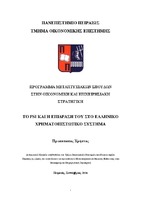Το PSI και η επίδρασή του στο ελληνικό χρηματοπιστωτικό σύστημα
PSI and its impact on the greek financial sector

View/
Keywords
Δημοσιονομική κρίση ; Τράπεζες ; Ελληνικό τραπεζικό σύστημα ; Private Sector Involvement (PSI) ; CAMELS ; Fiscal crisis ; BanksAbstract
The recent global economic crisis is combined with the spectacular spread of financial innovations and attributed to the weaknesses of financial institutions to manage the assessment and evaluation of risks that exist in the modern world of international finance. The course of the Greek economy since the mid-90s until 2009, when the first signs of Greek fiscal recession occurred which continues with increasing rate until today, was marked by strong growth, which were based primarily to the rapid growth of domestic demand. The landmark year for the Greek economy has been in 2009, because Greece came against an enormous financial crisis already existed before, but actually overlooked in the positive climate that existed during the past years.
This work focuses on identifying and outlining the importance of the Greek financial system for economic activity. The Greek economy and the Greek banks have not remained unaffected by this crisis. The 4 remaining systemic banks are required to operate in a challenging environment such as the further reduction of growth rates, the increase in NPLs (Non Performing Loans) and the general difficulties in the money and capital markets. The results of the February 2012 agreement with the private participation of Greek government bonds through their impairment (PSI and PSI Plus) resulted in significant losses in the banking sector and the capital requirements should cover the Greek credit institutions, in an attempt to absorb the "shock" of their participation in the program is estimated to reach 40 billion euro (Blackrock 2012). Although Greek banks observing the necessary rules of the Basel regulatory text to address the risk, it became clear that there should be stricter rules, stricter assessment methods and stringent measures to anticipate the risks faced. The recapitalization, restructuring and tighter control within the Greek banking system now seems to be necessary to further smooth operation, reliability of the banking system and the improvement of the Greek economy through fiscal reforms.
The analysis of the above is discussed in the fourth chapter of this thesis. The evaluation of the four Greek systemic banks (NBG, Piraeus, Eurobank, Alpha Bank) for the years 2009 to 2015 by using the CAMELS method will help us draw useful conclusions for the impact of financial crisis in the Greek banking system. From the empirical study conclusions are drawn related to capital adequacy, liquidity and profitability during the crisis. Finally we analyze the effectiveness of the data and presented recommendations for the future development of the operation of Greek banks.


